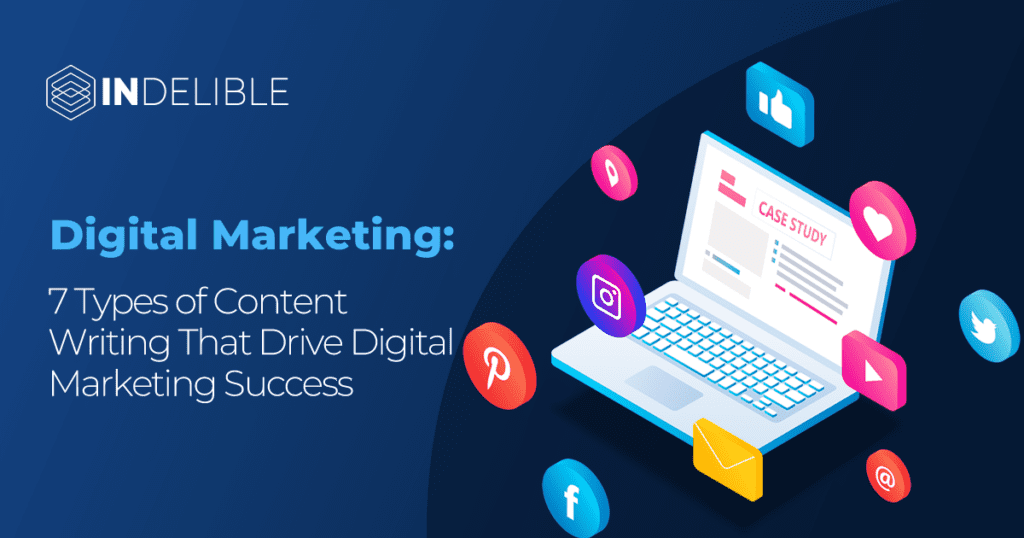
In this blog post, we explore the world of content writing, an influential tool that can be harnessed to accomplish various marketing objectives. Although we recognize many other types of digital content exist and the digital landscape is often changing, our focus is exploring seven widely utilized types of content writing in digital marketing. Each type boasts distinct advantages, and the ideal style largely hinges on your organization’s goals.
This article will highlight the following content writing types: blog posts, ebooks, whitepapers, case studies, social media posts, email marketing, and press releases. We will define each content type, explain how they can be leveraged to realize your marketing goals and provide valuable tips for crafting compelling content.
- Blog posts: Share expertise, attract visitors, promote products, generate leads
- Ebooks: Comprehensive, offer specific solutions, generate leads or sell products
- Whitepapers: In-depth analysis, establish expertise, attract new readers
- Email marketing: Stay in touch, promote products, generate leads, build relationships.
- Case studies: Showcase success, build trust, generate leads
- Social media posts: Share information, engage with audience, promote content
- Press releases: Gain media attention, announce news, launch campaigns, share impact
By the conclusion of this blog post, you will better comprehend the diverse types of content writing at your disposal and how you can effectively utilize them to achieve your marketing initiatives.
1. Blog Posts
Blog posts are a valuable way to share your stories and expertise with your audience. They attract new visitors to your website, promote your products or services, and help build relationships with potential customers. Blog posts also generate leads and establish your brand as a thought leader.
By publishing high-quality content regularly you can provide valuable information, position yourself as an authority, and improve your website’s visibility (yes, SEO!). Longer blog posts allow for in-depth exploration of topics, comprehensive guides, and addressing reader questions. This expanded content adds value, encourages social sharing, and boosts engagement, ultimately helping you reach a wider audience and achieve your marketing goals.
2. Ebooks
Ebooks offer extensive information and insights, making them highly valuable to users. They go beyond mere content and provide targeted solutions that address specific needs. By digging into in-depth topics, ebooks cater to the curiosity and interests of readers, empowering them with knowledge and practical advice.
Additionally, ebooks serve as powerful marketing tools, generating leads and promoting the sale of products or services. With their ability to engage readers through compelling narratives and well-researched content, ebooks have become a staple in the digital landscape, enriching the reading experience and driving business success.
Ebooks are often used as lead magnets – that is the user exchanges their contact information for access to the content in the ebook. An informative ebook tailored to your target market is a perfect way to begin this relationship, and is often nurtured by welcome emails and a drip campaign to follow.
3. Whitepapers

Whitepapers are great for deep dives and data. Photo by Markus Spiske on Unsplash
Whitepapers are comprehensive resources that explore specific subjects, offering extensive analysis and insights. Their long-form nature allows for an in-depth exploration of complex topics, making them valuable assets for readers seeking detailed information. Beyond their informational value, whitepapers also play a crucial role in establishing oneself as an authority or expert in a particular field.
By presenting well-researched findings, data, and solutions, whitepapers showcase expertise and credibility, attracting new readers eager to learn from trusted sources. In content marketing, whitepapers hold immense potential for building brand reputation, advancing thought leadership, and expanding the audience base.
4. Email Marketing
Email marketing is a widely adopted practice that enables businesses to communicate regularly with their audience while promoting their products or services. Companies can deliver personalized and relevant content directly to subscribers’ inboxes through targeted email campaigns. This approach allows for consistent engagement and is a powerful tool for building brand awareness and loyalty.
Additionally, email marketing plays a vital role in lead generation, as businesses can strategically capture email addresses and use them to nurture relationships with potential customers. Email marketing encourages trust and strengthens the connection between organizations and their target audience by providing valuable content, exclusive offers, and personalized recommendations.
Pro tip: combine automated email drip campaigns with your lead magnets (usually ebooks and whitepapers) to nurture that lead!
5. Case Studies

Case studies show off your wins!
Photo by Teemu Paananen on Unsplash
Case studies provide tangible evidence of how your products or services have directly contributed to the success of other businesses, organizations, or people. By highlighting real-life scenarios and outcomes, case studies offer a compelling narrative showcasing your offerings’ value and effectiveness. They go beyond mere testimonials, providing in-depth analysis of the client’s specific challenges and how your solutions helped overcome them.
Through detailed explanations and concrete results, case studies build trust and credibility with potential customers, illustrating your expertise and ability to deliver tangible results. As powerful marketing tools, case studies generate leads by capturing the attention and interest of prospects seeking evidence of real-world success stories before making purchasing decisions.
6. Social Media Posts
Social media posts are crucial in maintaining visibility and relevance in today’s digital landscape. They are a popular means to share valuable information with your audience and foster engagement. Through concise and engaging content, social media posts enable you to promote various forms of content, such as blog posts, articles, infographics, videos, and more.
By leveraging the broad reach of social media platforms, you can attract attention to your content and drive traffic to your website or other online channels. Moreover, social media posts facilitate direct interaction with your audience, allowing for comments, likes, shares, and discussions, further enhancing brand visibility and building a community of loyal followers.
7. Press Releases
Press releases serve as an effective method to generate media coverage and increase visibility for your organization. Nonprofits and businesses can leverage press releases to announce noteworthy stories, new services or launch impactful campaigns. By crafting compelling and newsworthy content, press releases capture the attention of journalists and publications, increasing the chances of getting featured in news articles or other media outlets.
Moreover, press releases offer an opportunity to showcase how your organization makes a positive difference in the world, highlighting the social impact and inspiring others to join your cause. Through strategic distribution, press releases can amplify your message, expand your reach, and contribute to raising awareness about your nonprofit’s mission and achievements.
Next Steps In Digital Marketing
We have numerous other articles that touch on digital efforts for your business. Here are a couple worth exploring:
Effective Digital Marketing Writing: 7 Essential Steps for Success
In this article, we offer specific and practical advice on how to write compelling content. We delve into the essential elements that need to be addressed, such as structuring your content, using effective language and tone, and incorporating engaging storytelling techniques.
AI for Nonprofits: Unleashing the Potential of AI in Digital Marketing
This article explores the utilization of AI to supplement and simplify the writing process as a whole. While the primary focus is on nonprofits, the strategies and steps outlined can be adapted to various other business types.
Ready to Perfect Your Digital Presence?
In this post we covered a wide range of writing topics, from different types of content to tips for crafting compelling copy. We hope that this information has been helpful to you in your digital marketing efforts.
If you need help with your digital marketing schedule your free consultation now!